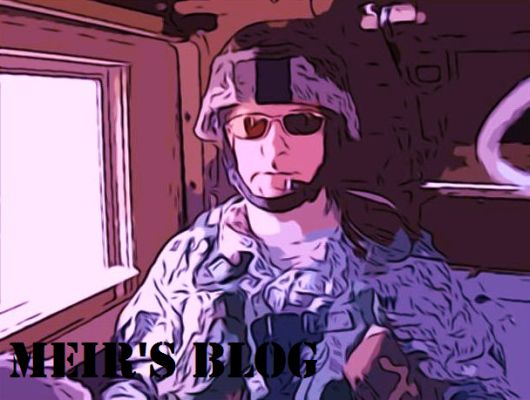(I am writing about a book I just finished reading.)
I read on the dust cover that Chasnoff is a comedian, so I am thinking his book will be funny, right? Wrong. It is bitter and cynical. But that's OK. Lots of good books can be bitter and cynical. But this book was bitter and cynical about an institution I like, y'know Israel, the Israeli Army, stuff like that, and that's fine too. It was still a good read. Not quite what I was looking for, but what I got. Joel Chasnoff's The 188th Crybaby Brigade is probably a pretty accurate description of what it is like to be a junior enlisted soldier going through tironut, basic training, in a combat unit of the Israeli Army.
I say that it was probably a fairly accurate description because I could have written that book myself and I recognize most of the details of Army life in his book, except for those here and there which are specific to Israel. Yes, I would have to change a few details, like I am in Iraq now with the US army and he was in Lebanon with the Israeli Army. He had some conversion issue in his family which I do not. But it is interesting to see how similar my military experience was to his. I mean, it is scary how similar our experiences really are. The same things that disappoint and frustrate me on a day to day basis about how things are run in the US Army are generally the same things that made his life miserable. Both of us apparently had long swathes of experience that made us wonder how we win wars given all we know about how things work (and we both came up with the same answer).
Interestingly, our experiences were similar both in terms of what we experienced in the Army, say about "guard duty", "duck walks", "initial reception", annoying leadership, and the like, but also on a personal level. Reading him talk about telling his family was pretty familiar. And listening to how many people asked him why he joined the Israeli Army and not the US Army was a mirror of my own experiences. I can't begin to recall how many people have asked me why I joined the US Army instead of the Israeli Army. (As if the point was just to join an army and then we flipped a coin about which one it was going to be.)
Of course I am willing to bet that both of our experiences are anomalous. Americans who are raised very Jewish do not typically join the IDF. Nor do they join the US Army. Some do, to be sure, but it is very rare. Those of us who do, come in to the Army completely unprepared. Whereas Israelis hear stories and get advice from their friends, brothers, sisters, parents, and teachers. They are raised knowing what is in store for them, whereas Americans do not. People who go to yeshiva for 20 years do not know what they are getting into when they join the American army either. So both can be pretty big culture shocks and one never knows what to expect. (One does not hear the same cynicism from, say, Haim Sabato who, like Chasnoff, was in the Armored Corps in the IDF and described the Yom Kippur war in his book Adjusting Sights.) It strikes me that if you don't know what you are doing, you are bound to be disappointed. Your assumptions about the kind of place you are in are dispelled one by one. You go in thinking that this is the greatest army in the world and that makes you think that it must be run by people with common sense and the training is logical and resources and positions are allocated in some way that is to the benefit of the Army. But none of this is true. Eventually you realize that the army is really now what you imagined it when you went in.
Seeing the similarities between the experiences he had in training and in Lebanon and my own here in Iraq made me think that it would be interesting to have American Jews in the US Army and American Jews in the Israeli Army trade stories or something. It would be informative to see how similar and different we really are.
The book read well and I am glad I read it. This is certainly a book I will plagiarize large sections of my own life story from.

Interesting post. I remeber reading in Sabato's book about the mass confusion during a battle against Syrian forces. His tank wasn't working right and at one point he really had no idea what to do.
ReplyDelete